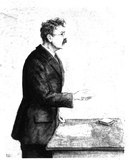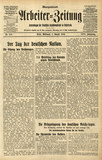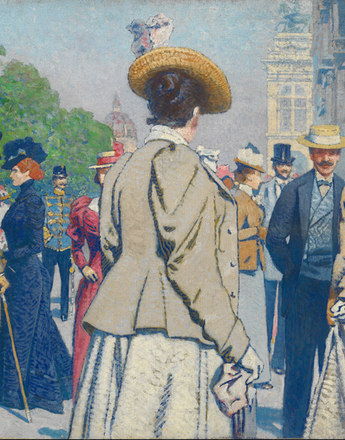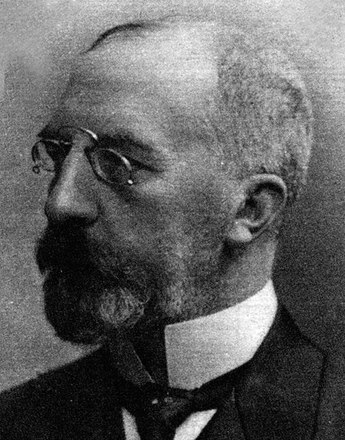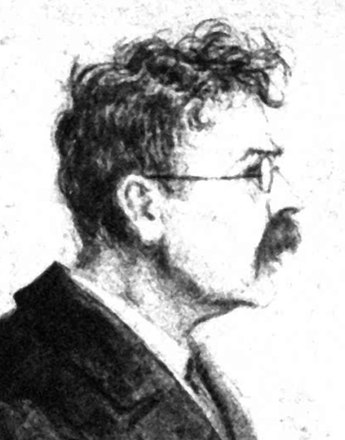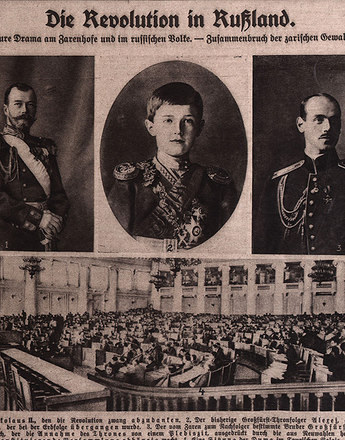The outbreak of war in July 1914 put the Austrian labour movement in an ambivalent position. It basically supported peace, following the model of international socialism, but at the same time it was becoming a party of the establishment.
The resolution adopted at the Imperial Conference of the Austrian German Social Democrats in May 1915 made the pro-war attitude manifest. It stated: "This crisis has put all the peoples of Austria-Hungary in a state of self defence […] to defend the Western economic, legal and cultural lands against the Tsar's addiction to conquest. For the time being the necessity of joint defence displaces political work towards peace."
The prime aim of the Social Democrats during the war was to maintain the party organisation, an objective they did not really attain in the light of the huge decline in membership numbers between 1914 and 1917. At the same time, they demanded the revival of the Reichsrat, which had been sidelined by Minister-President Stürgkh in 1914, and the re-establishment of the basic foundations of democracy.
In the first two years of the war, the majority of Social Democrats pursued a "policy of domestic truce". They supported the government's actions instead of calling for solidarity between the workers of all nations. In this way, it developed into a party that served the state and, despite its avowal of pacifism adopted in the prewar period, did not pursue a policy of peace. As soon as the war began, the inner-party disputes on the old question of worker participation in government affairs (the moderate right wing under Karl Renner, Victor Adler, Engelbert Pernerstorfer) or the rejection of the state, the Habsburg monarchy and the war (radical left wing under Robert Danneberg, Otto Bauer, Julius Deutsch and Friedrich Adler) were resurrected.
The latter fraction had found a leader figure in Friedrich Adler, Victor Adler's son, but for the time being it remained a small minority. It criticised the truce policies of the party leadership, which waived confrontation with the government, and instead argued strongly in favour of peace. Friedrich Adler's assassination of Minister President Stürkgh in October 1916 stirred up the forces of the left, which saw Adler as the spokesman of their hopes for peace.
The longer the war lasted and the more hope of victory faded, the more the left wing prevailed within the Social Democrats. Following Adler's assassination of Stürkgh and the outbreak of the Russian Revolution in March 1917, more and more party members shifted to the left camp. Finally, the party leadership agreed to reintegrate the left wing, now under the leadership of Otto Bauer, and modified its course. Thus once again it proved possible to preserve the unity of the Social Democrats. Although it now spoke out in favour of peace without territorial gains, it did not pursue an insistent peace policy and persevered in its opportunistic approach. The editor-in-chief of the Arbeiter Zeitung, Friedrich Austerlitz, wrote accurately: "The views of the left have become the dominant views, while it is generally the tactics of the right that are regarded as correct."
Translation: David Wright
Buchmann, Bertrand Michael: Kaisertum und Doppelmonarchie, Wien 2003
Berchtold, Klaus: Österreichische Parteiprogramme 1868-1966, Wien 1967
Ehrenpreis, Petronilla: Kriegs- und Friedensziele im Diskurs. Regierung und deutschsprachige Öffentlichkeit Österreich-Ungarns während des Ersten Weltkriegs, Innsbruck/Wien/Bozen 2005
Hautmann, Hans/Kropf, Rudolf: Die österreichische Arbeiterbewegung vom Vormärz bis 1945. Sozialökonomische Ursprünge ihrer Ideologie und Politik, Linz 1974
Ardelt, Rudolf G.: Sozialdemokratie und bürgerliche Öffentlichkeit. Überlegungen zum Hainfelder Parteitag, in: Ackerl, Isabella/Hummelberger, Walter/Mommsen, Hans (Hrsg.): Politik und Gesellschaft im alten und neuen Österreich. Festschrift für Rudolf Neck zum 60. Geburtstag. Bd. I, Wien 1981, 214-238
Wandruszka, Adam: Österreichs politische Struktur. Die Entwicklung der Parteien und politischen Bewegungen, in: Benedikt, Heinrich (Hrsg.): Geschichte der Republik Österreich, Wien 1977, 289-486
Quotes:
"This crisis has put all the peoples …“: Resolution, quoted from: Berchtold, Klaus: Österreichische Parteiprogramme 1868-1966, Wien 1967, 29 (Translation)
"The views of the left …“: Austerlitz, Friedrich, quoted from: Ehrenpreis, Petronilla: Kriegs- und Friedensziele im Diskurs. Regierung und deutschsprachige Öffentlichkeit Österreich-Ungarns während des Ersten Weltkriegs, Innsbruck/Wien/Bozen 2005, 284 (Translation)
-
Chapters
- Preconditions and beginnings of political participation
- On the road to political participation
- Liberalism and conservatism
- The rise and fall of liberalism
- Workers unite!
- Party of the masses
- Between a truce policy and left-wing radicalism
- Karl Lueger and the "Sausage Pot Party"
- "The Colossus of Vienna"
- Rise and fall
- Commitment to the Monarchy
- "Greater German", "Smaller German" or "German National"?
- "German and loyal, outright and true"
- "Prussian plestilence" or Habsburgophilia
- The battle for the 'national electorate'


